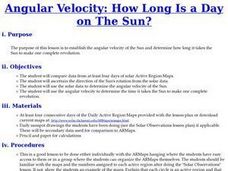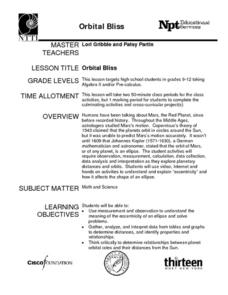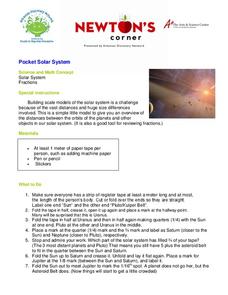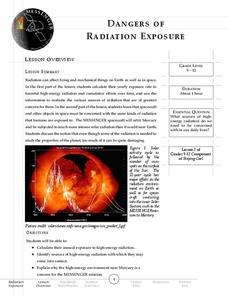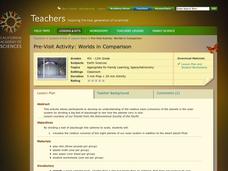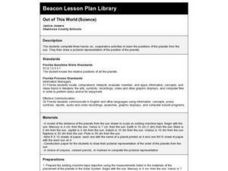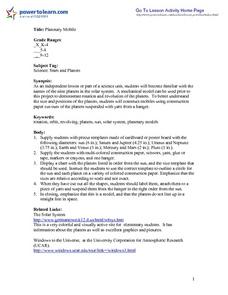Curated OER
Angular Velocity: How Long Is a Day on The Sun?
Students establish the angular velocity of the Sun and determine how long it takes the Sun to make one complete revolution. They determine what angular velocity is and how it can be useful in determining the speed and direction of any...
Curated OER
Orbital Bliss
Most young mathematicians are aware that the planets don’t orbit the sun in a circle but rather as an ellipse, but have never studied this interesting feature. This resource looks at the planetary orbits in more detail and helps learners...
Curated OER
Inner Planet Properties
In this planets worksheet, students complete a graphic organizer by determining their weight on that planet, its distance from the sun, the days it would take to travel from the Earth, and any other special features.
Curated OER
The Nine Planets
Sixth graders examine and investigate the solar system. They participate in a Webquest, and create a Powerpoint presentation that is meant to be a research guide to help alien visitors find a suitable habitat in the solar system.
Curated OER
Determining distance between planets and the Sun
Learners use a model to determine the distance between the sun and plants in our solar system. They determine a scale to use that represents the distance between the Earth and sun. Students calculate the scale distance that each planet...
Curated OER
Planet Picking
Middle schoolers arrange the planets according to their distances from the sun. In this astronomy lesson, students list interesting properties about each planet. They identify an unknown planet photo.
Curated OER
The Planets Moon
Students explore the theories of the creation of the universe and examine the properties of celestial bodies. They analyze the relationship between the sun, Earth and other planets. They discover the infinite potential of the science of...
Curated OER
Changes Inside Planets
Pupils investigate the concept of planetary differentiation. They complete an experiment to simulate it using gelatin and food. The lesson includes vocabulary to increase reading comprehension skills as part of the inquiry. The lesson...
Curated OER
Pocket Solar System
Motivate your class with this lesson. Learners explore the solar system and practice working with fractions using this resource. They construct scale models of our solar system, and use fractions to correctly configure the solar system...
Illustrative Mathematics
Tilt of Earth's Axis and the Four Seasons
Geometry meets earth science as high schoolers investigate the cause and features of the four seasons. The effects of Earth's axis tilt features prominently, along with both the rotation of the earth about the axis and its orbit about...
Space Awareness
Making A Sundial
Can people really measure time just by using the sun? Scholars venture outside on a nice, sunny day to build sundials and learn how people measured time 600 years ago. The class builds two different sundials while gaining practice with...
Messenger Education
Dangers of Radiation Exposure
Gamma radiation, which is harmful, is useful in treating cancers. In the second lesson in a series of four, young scientists take surveys and calculate their yearly exposure to ionizing radiation. Then they read about how harmful their...
University of Colorado
The Jovian Basketball Hoop
Can you listen to Jupiter on a simple radio? Turns out the answer is yes! The resource instructs scholars to build a simple radio to pick up the radio waves created when the charged particles from the sun hit Jupiter's magnetic...
Teach Engineering
A New Angle on PV Efficiency
Let me get an angle on this! Investigate the orientation of a photovoltaic panel and its effect on efficiency. By using a light source, learners collect and plot current output to determine the ultimate orientation. The resource includes...
University of Colorado
The Jovian Basketball Hoop
A radio receives radio signals, converts them to an electrical signal, then converts this signal to a sound signal, and amplifies the sound so people can hear it. Class members use this information to create a short-wave radio antenna...
Pacific Science Center
Worlds in Comparison
Young astronomers follow a step-by-step procedure for dividing a lump of dough into parts, resulting in a scaled volume set of puny planets. Along with the printable directions is a template chart of planet names on which learners can...
Curated OER
Our Changing View of the Solar System
Students identify and name the eight planets and the five dwarf planets in our solar system. In this space science lesson, students view a slideshow of the planets and label them on an included Solar System chart.
Curated OER
Out of This World (Science)
Students participate in various hands-on activities to visually demonstrate the positions of the planets from the sun. Then they draw a pictorial representation of the order of planets from the sun.
Curated OER
Planetary Mobile
Students receive pre-cut templates of cardboard with appropriate diameters of each planet and the sun. They use multi-colored construction paper, scissors, yarn, and other art supplies to create their own models of planets. When students...
Curated OER
Unit 2 Sun & Stars
Young scholars describe stellar objects using terms such as stars, planets, satellites, orbits and light. In this sun and stars unit, students research stellar objects through seven individual lessons discovering star characteristics,...
Curated OER
Planets or Not, Here We Come!
Students, working in groups, research planets in terms of the size, temperature, number of moons, and potential for life. They use packets and worksheets as guides for their research. Students may role-play as aliens visiting their...
Curated OER
Up in the Sky
First graders associate events and objects with day or night. They create a word bank and use is as a reference to create sentences about the sun. They conduct sun-themed experiments and art projects.
Curated OER
The Path of the Sun, the Ecliptic
High schoolers are introduced to the ecliptic, the zodiac and the apparent motions of the Sun, Moon and planets across the sky.
Curated OER
An Interview with Mr. Sol
Students explore the sun, the galaxy, and planets. As an introduction to a class discussion of the sun, students perform a skit. They discuss the elements that make up the sun, stars and planets.


